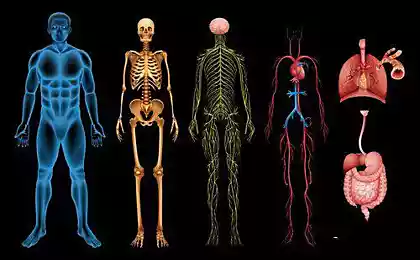926
I don'T want to lose weight!
And once again spring, and again hope. Friend to discuss the next weight loss over a Cup of coffee and cake, the coach recommends to go to the cheese and cauliflower (read: proteins and fibers), even mothers are part of the parent Committee, after discussing the gifts for teachers on March 8 jumps on the topic: "Winter gift is not passed, it is time to lose weight!". But... not all are in this party. And increasingly heard, in response to: "it's Time!", — opinion: "I don't want to lose weight!"
Victims of diet mentality
The first thing that comes to mind when a person says, "I don't want to lose weight", is that we all become victim to diet mentality. The food and weight ceased to be largely an aspect of private life, becoming moral aspects. The way you eat and how much you weigh, became a moral issue. The person who overeats or is overweight, has now become okay to condemn and consider uncool and lazy. The man says, "I don't want to lose weight". There are several options how to translate this into our language:
Option one: marketing is not for me and not about me
Perhaps "I don't want to lose weight" is a protest against having to go on about the belief system that enslaves woman, makes her the object of use of all kinds of companies selling the memberships at health clubs, slimming pills, fashion magazines, standards which have to comply with. And "I don't want to lose weight" in this case means: "I will not obey this pandemonium, I'm not going to participate in it".
While this position of "I am ready to accept my body the way it is" is not very common for Russia (although, working in the field of training people intuitive eating, I see people come to this). And if in the story of "I want to lose weight" the body perceived as an object (and not only as an object, and even as a means of achieving certain goals, social benefits — if I'm thin, I'm beautiful, I will love. I have a job, I'll be popular. I would with great respect. To my opinion will be listened to"),here the focus shifts: "I agree to live in this body, and I'll even try to find a way to get pleasure from it".

Option two: my body is my home
In the position of "I don't want to lose weight" can be a shift in position, which I think is very cute, very harmonious: "My body is my home. My weight and how I'm built physically, very largely determined by genetics." The people who put so much meaning in his "I don't want to lose weight", realize that to manipulate the weight in very small limits and those who succeed in the field of chronic weight loss, pay for a high price, in fact his whole life devoting to the struggle with weight and giving up many important and interesting cases.
The second variant of the metaphor "my body is my home" I will give the wording an American nutritionist who says,"I'm not abandoning the idea of losing weight. I refuse the idea to focus on weight loss as the goal of life." To decrypt this message, you can: "Reduce weight? Why not, if you need it! Another thing — do not make this the meaning of life! If I come to the conclusion that my body to reduce weight fundamentally impossible (and it is very often so), it makes sense to settle in the house that I have, decorate it, love it, make cozy. Because to demolish the house and build a new one is, for me, unaffordable and ineffective".
A third option: terrible and shameful
This scenario is less positive than the first two, but I cite, relying on cases from the practice. People have not accepted themselves, have not ceased to be ashamed of its completeness (even if it is imaginary completeness), has not ceased to experience social humiliation from the fact that his body is not like he likes... And he's scared to even start losing weight! He has many times tried to lose weight and did not, and he realizes that it is a dead-end path. He's got a set of honors as children: "If there is no guarantee that I will solve this problem, I even will not start, because they are too afraid of failure." And if these people say: "I don't want to lose weight" — that they can be understood as: "I don't want to suffer, I don't want to feel humiliated. I don't want to lose. I know in advance that nothing would come of it. In fact, I'm desperate".
Option four: leave me alone
While the woman is within those dimensions that are acceptable for this culture (if we look at Moscow and St. Petersburg, it is the 36th European size, with a maximum of 38, and if we go to the South of Russia or to Georgia, there can already be a little bit more and be considered thin enough (remember the Georgian joke about the fact that Manana is stuck in a hula-Hoop? "Manana, go home — don't ruin your figure!".)
And then — the story about the fact that once a woman goes this is almost a visible border surrounding her begin to put pressure on the brain. One patient told how, in adolescence, the Pope said a phrase that strongly influenced her attitude to weight loss.Someone from the family came to visit and said, "Girl, your growing!", — what the Pope replied: "Yes, but all at length growing up, and she's wide!". And for the first time she felt a tremendous amount of shame at his own body. For what her body some not so.
When a person falls out of standard, he has a feeling that he has no right to take responsibility for their lives. As if the fact that his body is different, proves that he is weak-willed, irresponsible, undisciplined and his need to teach.
And then "I don't want to lose weight" is a protective reaction: "Leave me alone," "Protect me from your Intrusive violations of my psychological boundaries." Because the man whose body differs from the standards — this is the person who accepted to give advice, to impose some assistance and recommend that he eat and what not to eat. This person is constantly loaded with stories, who both lost weight and what has helped to lose weight.

Why we suggest to lose weight?
Susie Orbach, the British psychoanalyst and therapist who treated Princess Diana of bulimia, in the book "Fat is a feminist subject," wrote that the female body in culture is presented as originally defective. And only after we their body a certain way will treat deodorant, perfumes, remove hair in certain places, and in other places will build up, something to do with nails, something with the skin on elbows and heels, then... only Then a woman can contact, can show body other people. Imagine what level of uncertainty it generates? While in Russia we are much more focused on the fact that to note how the man looks and how he dressed, for example, than is customary in Europe.
All this talk about losing weight — it is fear and marketing. Fear that we will not love. And that once we do not get to control your body, you do not get to control anything — no relationship, no career. Control will be lost. And marketing of: generating we are in uncertainty, we can sell anything we buy. But when you understand why there's this pressure, it is easier for you to overcome it.
How to overcome pressure and to protect yourselfIs the Golden rule: the behavior is not reinforced, fades. And if you do not respond to the symptoms of anxiety and desire to get you to lose weight, do not listen to these conversations and not protesting against them, then this behavior is extinguished. If you for a few minutes will become deaf when you recommend to lose weight or specify when you will begin to lose weight (and will actively keep the conversation on other topics), then the pressure that you will be actively reduced. Broken record technique is another effective tool. You choose one single phrase that describes your position, and learn it, without changing it a word, or a comma. And all requests to you about this standard the same. For example: "when are you going to lose weight?". You:"I don't plan to discuss my weight with other people". "But it's health, it is an important question. Have you ever been tested? You must have pressure. You must have sugar." You: "I don't plan to discuss my weight with other people." Consciously refuse to participate in fat talk (eng.: talk about fat, "fat talk"): do not support and do not participate in any conversations at work, on the Internet, with friends and girlfriends concerning weight loss, with topics including: "these clothes make me look fat" or "I can't buy clothes of the right size". Both the first and the second method is hard psychological techniques, but they are most effective to stop trolling is caring: when under the guise of concern about the health of the opponent shall have the opportunity to humiliate, devalue and to recommend how to live. published
Author: Svetlana Bronnikova
P. S. And remember, just changing your mind — together we change the world! ©
Source: //www.littleone.ru/articles/more/zdorovieipsihologi/1937
Victims of diet mentality

The first thing that comes to mind when a person says, "I don't want to lose weight", is that we all become victim to diet mentality. The food and weight ceased to be largely an aspect of private life, becoming moral aspects. The way you eat and how much you weigh, became a moral issue. The person who overeats or is overweight, has now become okay to condemn and consider uncool and lazy. The man says, "I don't want to lose weight". There are several options how to translate this into our language:
Option one: marketing is not for me and not about me
Perhaps "I don't want to lose weight" is a protest against having to go on about the belief system that enslaves woman, makes her the object of use of all kinds of companies selling the memberships at health clubs, slimming pills, fashion magazines, standards which have to comply with. And "I don't want to lose weight" in this case means: "I will not obey this pandemonium, I'm not going to participate in it".
While this position of "I am ready to accept my body the way it is" is not very common for Russia (although, working in the field of training people intuitive eating, I see people come to this). And if in the story of "I want to lose weight" the body perceived as an object (and not only as an object, and even as a means of achieving certain goals, social benefits — if I'm thin, I'm beautiful, I will love. I have a job, I'll be popular. I would with great respect. To my opinion will be listened to"),here the focus shifts: "I agree to live in this body, and I'll even try to find a way to get pleasure from it".

Option two: my body is my home
In the position of "I don't want to lose weight" can be a shift in position, which I think is very cute, very harmonious: "My body is my home. My weight and how I'm built physically, very largely determined by genetics." The people who put so much meaning in his "I don't want to lose weight", realize that to manipulate the weight in very small limits and those who succeed in the field of chronic weight loss, pay for a high price, in fact his whole life devoting to the struggle with weight and giving up many important and interesting cases.
The second variant of the metaphor "my body is my home" I will give the wording an American nutritionist who says,"I'm not abandoning the idea of losing weight. I refuse the idea to focus on weight loss as the goal of life." To decrypt this message, you can: "Reduce weight? Why not, if you need it! Another thing — do not make this the meaning of life! If I come to the conclusion that my body to reduce weight fundamentally impossible (and it is very often so), it makes sense to settle in the house that I have, decorate it, love it, make cozy. Because to demolish the house and build a new one is, for me, unaffordable and ineffective".
A third option: terrible and shameful
This scenario is less positive than the first two, but I cite, relying on cases from the practice. People have not accepted themselves, have not ceased to be ashamed of its completeness (even if it is imaginary completeness), has not ceased to experience social humiliation from the fact that his body is not like he likes... And he's scared to even start losing weight! He has many times tried to lose weight and did not, and he realizes that it is a dead-end path. He's got a set of honors as children: "If there is no guarantee that I will solve this problem, I even will not start, because they are too afraid of failure." And if these people say: "I don't want to lose weight" — that they can be understood as: "I don't want to suffer, I don't want to feel humiliated. I don't want to lose. I know in advance that nothing would come of it. In fact, I'm desperate".
Option four: leave me alone
While the woman is within those dimensions that are acceptable for this culture (if we look at Moscow and St. Petersburg, it is the 36th European size, with a maximum of 38, and if we go to the South of Russia or to Georgia, there can already be a little bit more and be considered thin enough (remember the Georgian joke about the fact that Manana is stuck in a hula-Hoop? "Manana, go home — don't ruin your figure!".)
And then — the story about the fact that once a woman goes this is almost a visible border surrounding her begin to put pressure on the brain. One patient told how, in adolescence, the Pope said a phrase that strongly influenced her attitude to weight loss.Someone from the family came to visit and said, "Girl, your growing!", — what the Pope replied: "Yes, but all at length growing up, and she's wide!". And for the first time she felt a tremendous amount of shame at his own body. For what her body some not so.
When a person falls out of standard, he has a feeling that he has no right to take responsibility for their lives. As if the fact that his body is different, proves that he is weak-willed, irresponsible, undisciplined and his need to teach.
And then "I don't want to lose weight" is a protective reaction: "Leave me alone," "Protect me from your Intrusive violations of my psychological boundaries." Because the man whose body differs from the standards — this is the person who accepted to give advice, to impose some assistance and recommend that he eat and what not to eat. This person is constantly loaded with stories, who both lost weight and what has helped to lose weight.

Why we suggest to lose weight?
Susie Orbach, the British psychoanalyst and therapist who treated Princess Diana of bulimia, in the book "Fat is a feminist subject," wrote that the female body in culture is presented as originally defective. And only after we their body a certain way will treat deodorant, perfumes, remove hair in certain places, and in other places will build up, something to do with nails, something with the skin on elbows and heels, then... only Then a woman can contact, can show body other people. Imagine what level of uncertainty it generates? While in Russia we are much more focused on the fact that to note how the man looks and how he dressed, for example, than is customary in Europe.
All this talk about losing weight — it is fear and marketing. Fear that we will not love. And that once we do not get to control your body, you do not get to control anything — no relationship, no career. Control will be lost. And marketing of: generating we are in uncertainty, we can sell anything we buy. But when you understand why there's this pressure, it is easier for you to overcome it.
How to overcome pressure and to protect yourselfIs the Golden rule: the behavior is not reinforced, fades. And if you do not respond to the symptoms of anxiety and desire to get you to lose weight, do not listen to these conversations and not protesting against them, then this behavior is extinguished. If you for a few minutes will become deaf when you recommend to lose weight or specify when you will begin to lose weight (and will actively keep the conversation on other topics), then the pressure that you will be actively reduced. Broken record technique is another effective tool. You choose one single phrase that describes your position, and learn it, without changing it a word, or a comma. And all requests to you about this standard the same. For example: "when are you going to lose weight?". You:"I don't plan to discuss my weight with other people". "But it's health, it is an important question. Have you ever been tested? You must have pressure. You must have sugar." You: "I don't plan to discuss my weight with other people." Consciously refuse to participate in fat talk (eng.: talk about fat, "fat talk"): do not support and do not participate in any conversations at work, on the Internet, with friends and girlfriends concerning weight loss, with topics including: "these clothes make me look fat" or "I can't buy clothes of the right size". Both the first and the second method is hard psychological techniques, but they are most effective to stop trolling is caring: when under the guise of concern about the health of the opponent shall have the opportunity to humiliate, devalue and to recommend how to live. published
Author: Svetlana Bronnikova
P. S. And remember, just changing your mind — together we change the world! ©
Source: //www.littleone.ru/articles/more/zdorovieipsihologi/1937























